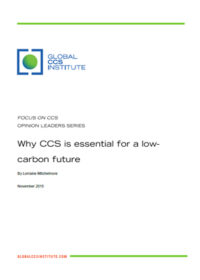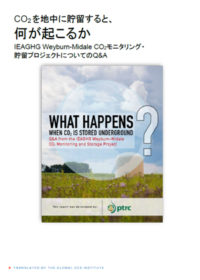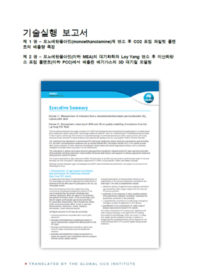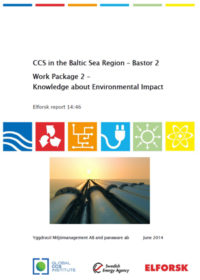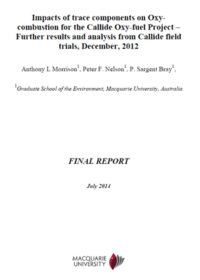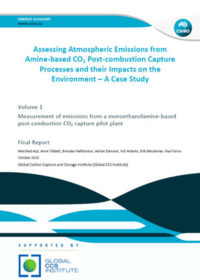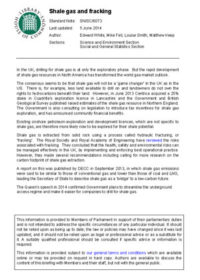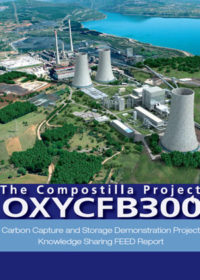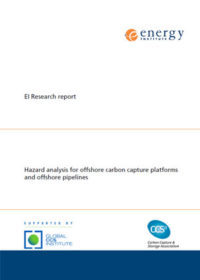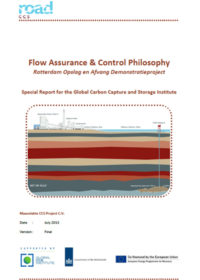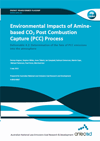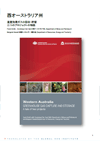Resources
Publications
Our publications, reports and research library hosts over 500 specialist reports and research papers on all topics associated with CCS.
View our Publication Library Disclaimer.
Filter by
Why CCS is essential for a low-carbon future
10th November 2015
Topic(s): Carbon capture use and storage (CCUS), Engineering and project delivery, Health safety and environment, Public engagement
Lorraine Mitchelmore's article, Why CCS is Essential for a Low-Carbon Future, is part of an opinion leader’s article series for Focus on CCS. The series features contributions from world leading authorities on carbon capture and storage (CCS), presenting their perspectives on the role for the technology in reducing our carbon dioxide emissions. The series is published by the Global CCS Institute to contribute to the conversation about CCS within the portfolio of options to help tackle climate change.
Lorraine Mitchelmore is President and Canada Country Chair of Shell Canada Limited, Executive Vice President Heavy Oil for Upstream Americas.
Disclaimer
The content within the Global CCS Institute Publications, Reports and Research Library is provided for information purposes only. We make every effort and take reasonable care to keep the content of this section up-to-date and error-free. However, we make no claim as to its accuracy, currency or reliability.
Content and material featured within this section of our website includes reports and research published by third parties. The content and material may include opinions and recommendations of third parties that do not reflect those held by the Global CCS Institute.
CO2を地中に貯留すると、何が起こるか – IEAGHG Weyburn-Midale CO2モニタリング・貯留プロジェクトについてのQ&A
4th September 2015
Topic(s): Carbon capture use and storage (CCUS), CO2 storage, Health safety and environment
IEAGHG Weyburn-Midale CO2モニタリング・貯留プロジェクトは、カナダ・サスカチェワン州南東の石油埋蔵地貯留所へのCO2圧入および貯留効果を調査するために設計された研究プログラムである。「CO2を地中に貯留すると、何が起こるか」は、CCSについて一般市民から頻繁に寄せられる質問に対し、上記プロジェクトから得られた広範囲に及ぶデータおよび調査結果に基づく回答をまとめたものである。
Japanese translation of What happens when CO2 is stored underground? Q&A from the IEAGHG Weyburn-Midale CO2 Monitoring and Storage Project.
Disclaimer
The content within the Global CCS Institute Publications, Reports and Research Library is provided for information purposes only. We make every effort and take reasonable care to keep the content of this section up-to-date and error-free. However, we make no claim as to its accuracy, currency or reliability.
Content and material featured within this section of our website includes reports and research published by third parties. The content and material may include opinions and recommendations of third parties that do not reflect those held by the Global CCS Institute.
기술실행 보고서. 모노에탄올아민
4th June 2015
Topic(s): Carbon capture use and storage (CCUS), CO2 capture, Health safety and environment
기술실행 보고서
제 1 권 – 모노에탄올아민(monoethanolamine)계 연소 후 CO2 포집 파일럿 플랜트의 배출량 측정
제 2 권 – 모노에탄올아민(이하 MEA)의 대기화학과 Loy Yang 연소 후 이산화탄소 포집 플랜트(이하 PCC)에서 배출된 배기가스의 3D 대기질 모델링
이 문서는 호주연방과학원(이하 CSIRO)이 주도한 아민계 연소 후 이산화탄소포집 기술의 대기질 영향에 대한 조사의 주요 결과를 요약한 것이다. 포집 공정의 환경 영향에 대한 지식을 확대하기 위하여 국제탄소포집저장연구소(Global Carbon Capture and Storage Institute: 이하 GCCSI)가 시작한 이 연구는 실제 배출량을 측정하였으며, 호주 빅토리아주에 위치한 AGL의 Loy Lang PCC 플랜트에서 대기질(air quality)에 대한 사례연구(case study)를 제공하고 있다.
Korean Translation of the Executive Summary of CSIRO Report Assessing atmospheric emissions from an amine-based CO2 post-combustion capture processes and their impacts on the environment: a case study.
Disclaimer
The content within the Global CCS Institute Publications, Reports and Research Library is provided for information purposes only. We make every effort and take reasonable care to keep the content of this section up-to-date and error-free. However, we make no claim as to its accuracy, currency or reliability.
Content and material featured within this section of our website includes reports and research published by third parties. The content and material may include opinions and recommendations of third parties that do not reflect those held by the Global CCS Institute.
CCS in the Baltic Sea Region – Bastor 2. Work package 2: knowledge about environmental impact
2nd April 2015
Topic(s): Carbon capture use and storage (CCUS), Health safety and environment
The objective of this study is to document current knowledge, hazards and risks on environmental impacts in a possible future CCS project in the offshore Baltic Sea Area. Another purpose is to also present a tentative EIA work plan for a field trial project as scoped out in Chapter 2. Further, the intention is to add new knowledge, if possible, to what is already known or applicable to CCS activities in the offshore Baltic Sea Area.
Yggdrasil Miljömanagement AB, together with panaware ab, were commissioned by Elforsk AB to document current knowledge about environmental impacts in the light of a possible CCS field trial project in the offshore Baltic Sea Area. This report is part of the project Bastor2 (Baltic Storage of CO2), with the overriding objective to assess the opportunities and conditions for CO2 sequestration in the region. The project, which ran from June 2012 through September 2014, was financed by the Swedish Energy Agency and the Global CCS Institute in collaboration with a number of Swedish industrial and energy companies.
Disclaimer
The content within the Global CCS Institute Publications, Reports and Research Library is provided for information purposes only. We make every effort and take reasonable care to keep the content of this section up-to-date and error-free. However, we make no claim as to its accuracy, currency or reliability.
Content and material featured within this section of our website includes reports and research published by third parties. The content and material may include opinions and recommendations of third parties that do not reflect those held by the Global CCS Institute.
Impacts of trace components on Oxy-combustion for the Callide Oxy-fuel Project – Further results and analysis from Callide field trials, December, 2012
1st July 2014
Topic(s): Carbon capture use and storage (CCUS), CO2 capture, Health safety and environment
ANLEC R&D funded this technical report that follows a previous report on field experiment results from the retrofitted Callide-A Oxyfuel demonstration power plant. Additional analysis was conducted to bring this project to a conclusion. Further results support that the levels of metals, acid gases and mercury in particular, are below the level of operational concern in the CO2 processing unit (CPU), and that the health and environmental outcomes under oxy-firing conditions are likely to be similar to those achieved when using conventional air-firing.
Disclaimer
The content within the Global CCS Institute Publications, Reports and Research Library is provided for information purposes only. We make every effort and take reasonable care to keep the content of this section up-to-date and error-free. However, we make no claim as to its accuracy, currency or reliability.
Content and material featured within this section of our website includes reports and research published by third parties. The content and material may include opinions and recommendations of third parties that do not reflect those held by the Global CCS Institute.
Assessing atmospheric emissions from an amine-based CO2 post-combustion capture processes and their impacts on the environment: a case study
1st May 2014
Topic(s): Carbon capture use and storage (CCUS), CO2 capture, Health safety and environment
This two volume study was commissioned by the Global CCS Institute to expand knowledge on the environmental impacts of the capture process of carbon capture and storage (CCS). The study measured actual emissions and explored a case study into air quality at the AGL Loy Lang PCC Plant in Victoria, Australia.
Executive Summary
This document summarises the major outcomes of the CSIRO-led investigation into the potential air quality impacts of amine-based post-combustion carbon capture (PCC) technology.
Volume 1. Measurement of emissions from a monoethanolamine-based post-combustion CO2 capture pilot plant
This report describes the comprehensive experimental investigation of emissions concentrations of selected PCC liquors and process gas streams at the AGL Loy Yang Power Station using the CSIRO Loy Yang pilot-scale post-combustion capture (PCC) plant (LYPP). The benchmark solvent, monoethanolamine (MEA), was used to capture CO2 from the process gas of the Loy Yang coal-fired power plant. The experimental study focused on applying, evaluating and, where required, further developing current stack sampling and analytical techniques to identify the major chemical components existing in the process.
Volume 2. Atmospheric chemistry of MEA and 3D air quality modelling of emissions from the Loy Yang PCC plant
This report describes an experimental and modelling study of the impact of ethanolamine (MEA) emissions from the CSIRO Loy Yang pilot scale PCC plant. A chemical transport modelling system was used to simulate the likely impact of retrofitting a PCC installation to Loy Yang power station. A representative month (March 2005) was selected on the basis of having many of the atmospheric process of relevance to the chemical transformation of MEA and near-source plume strikes from the power station.
Disclaimer
The content within the Global CCS Institute Publications, Reports and Research Library is provided for information purposes only. We make every effort and take reasonable care to keep the content of this section up-to-date and error-free. However, we make no claim as to its accuracy, currency or reliability.
Content and material featured within this section of our website includes reports and research published by third parties. The content and material may include opinions and recommendations of third parties that do not reflect those held by the Global CCS Institute.
Shale gas and fracking
5th April 2014
Topic(s): Fuel switching, Health safety and environment, Policy law and regulation
The United Kingdom’s House of Commons Library prepared this note for Members of Parliament, to summarise the status of drilling for shale gas in the UK.
Disclaimer
The content within the Global CCS Institute Publications, Reports and Research Library is provided for information purposes only. We make every effort and take reasonable care to keep the content of this section up-to-date and error-free. However, we make no claim as to its accuracy, currency or reliability.
Content and material featured within this section of our website includes reports and research published by third parties. The content and material may include opinions and recommendations of third parties that do not reflect those held by the Global CCS Institute.
OXYCFB300 Compostilla Carbon Capture and Storage Demonstration Project: knowledge sharing FEED report
21st February 2014
Topic(s): Carbon capture use and storage (CCUS), CO2 capture, CO2 storage, CO2 transport, Health safety and environment, Permitting, Policy law and regulation
This report describes the lessons learned and provides detailed knowledge from the expert multidisciplinary teams - including mechanical, electrical and civil engineers, geologists, ecologists, lawyers, accountants – that carried out the extensive Front End, Engineering and Design (FEED) study of the full chain OXYCFB300 Project.
This document summarises all the engineering studies and considerations developed during the FEED. From the original conceptual idea, FEED engineering works have yielded a functional and technically feasible power plant, which successfully integrates oxycombustion technology with a state-of-the-art ultrasupercritical regenerative power cycle and with an innovative CO2 purification and compression process, integrated with a transport line that conducts the CO2 at dense phase to the final CO2 geologic sequestration site, for an operational life of 25 years.
Disclaimer
The content within the Global CCS Institute Publications, Reports and Research Library is provided for information purposes only. We make every effort and take reasonable care to keep the content of this section up-to-date and error-free. However, we make no claim as to its accuracy, currency or reliability.
Content and material featured within this section of our website includes reports and research published by third parties. The content and material may include opinions and recommendations of third parties that do not reflect those held by the Global CCS Institute.
Research report: hazard analysis for offshore carbon capture platforms and offshore pipelines
1st September 2013
Topic(s): Carbon capture use and storage (CCUS), CO2 hubs, CO2 transport, Health safety and environment
The intention of this publication is to provide a basic guide for the health and safety hazard analysis for offshore management of CO2 pipelines and platforms, where CO2 will be present as a part of carbon capture and storage (CCS) installations; communicate existing knowledge on pipeline and offshore facility design and operation; and identify areas of uncertainty where existing knowledge cannot be applied with sufficient confidence, considering the scale and nature of expected CCS operations in the future.
Disclaimer
The content within the Global CCS Institute Publications, Reports and Research Library is provided for information purposes only. We make every effort and take reasonable care to keep the content of this section up-to-date and error-free. However, we make no claim as to its accuracy, currency or reliability.
Content and material featured within this section of our website includes reports and research published by third parties. The content and material may include opinions and recommendations of third parties that do not reflect those held by the Global CCS Institute.
Flow assurance & control philosophy: Rotterdam Opslag en Afvang Demonstratieproject. Special report for the Global Carbon Capture and Storage Institute
31st July 2013
Topic(s): Carbon capture use and storage (CCUS), CO2 storage, CO2 transport, Health safety and environment
One of the key challenges for a large scale CCS demonstration project, like the ROAD project in the Netherlands, is to safely and efficiently operate the CO2 stream of an integrated CCS chain. For ROAD this means: capturing the CO2 from the flue gases of a coal-fired power plant, compressing and transporting the CO2 through a 25 km pipeline to an offshore platform and injecting the CO2 into a depleted gas reservoir 3.5 km below the sea bed.
This special report on the ‘Flow Assurance and Control Philosophy’ of the ROAD project provides an insight into the proposed control and operating systems for the CO2 stream of the integrated CCS chain in steady state, shutdown and start-up conditions.
Although it has not been practiced before, the Flow Assurance Study (FAS) conducted by ROAD has clearly shown that filling a reservoir of (very) low pressure to an end pressure of 300 bar is in practice possible, but one has to study the behaviour of CO2 in all its thermo-dynamic aspects with the parameters of the physical configuration of the transport system.
Disclaimer
The content within the Global CCS Institute Publications, Reports and Research Library is provided for information purposes only. We make every effort and take reasonable care to keep the content of this section up-to-date and error-free. However, we make no claim as to its accuracy, currency or reliability.
Content and material featured within this section of our website includes reports and research published by third parties. The content and material may include opinions and recommendations of third parties that do not reflect those held by the Global CCS Institute.
Environmental impacts of amine-based CO2 post combustion capture (PCC) process. Deliverable 4.2: Determination of the fate of PCC emissions into the atmosphere
5th July 2013
Topic(s): Carbon capture use and storage (CCUS), CO2 capture, Health safety and environment
This report is concerned with research performed as one of the five activities of the project funded by ANLEC R&D entitled “Environmental Impacts of Amine-based CO2 Post Combustion Capture (PCC) Process”.
This report is project deliverable 4.2 which details research undertaken as Activity 4: Determination of the fate of PCC emissions in the atmosphere. Outcomes from this work were used to perform a dispersion modelling scenario (deliverable 4.3) for the anticipated emissions from a black coal-fired power station retrofitted with an MEA-based CO2 capture plant.
Disclaimer
The content within the Global CCS Institute Publications, Reports and Research Library is provided for information purposes only. We make every effort and take reasonable care to keep the content of this section up-to-date and error-free. However, we make no claim as to its accuracy, currency or reliability.
Content and material featured within this section of our website includes reports and research published by third parties. The content and material may include opinions and recommendations of third parties that do not reflect those held by the Global CCS Institute.
西オーストラリア州 温室効果ガスの回収・貯留: 二つのプロジェクトの物語
6th June 2013
Topic(s): Carbon capture use and storage (CCUS), Health safety and environment
本書ではこれらの最先端のプロジェクトの相違点及び共通点を検証する。
Disclaimer
The content within the Global CCS Institute Publications, Reports and Research Library is provided for information purposes only. We make every effort and take reasonable care to keep the content of this section up-to-date and error-free. However, we make no claim as to its accuracy, currency or reliability.
Content and material featured within this section of our website includes reports and research published by third parties. The content and material may include opinions and recommendations of third parties that do not reflect those held by the Global CCS Institute.
